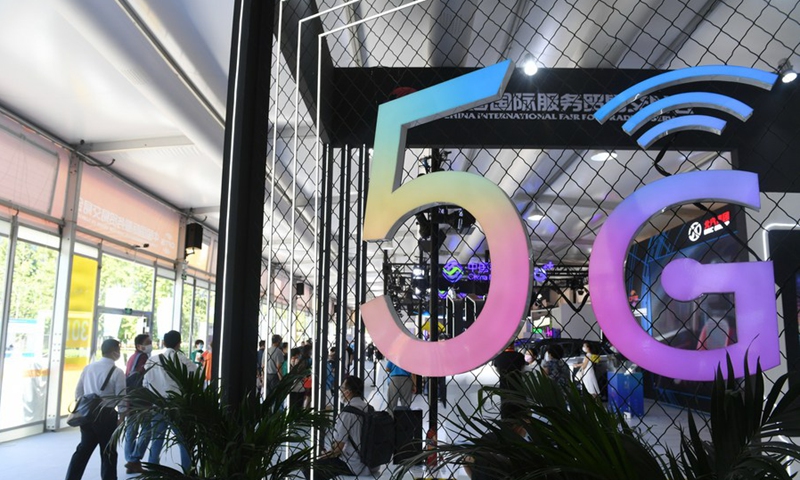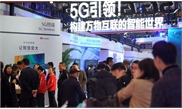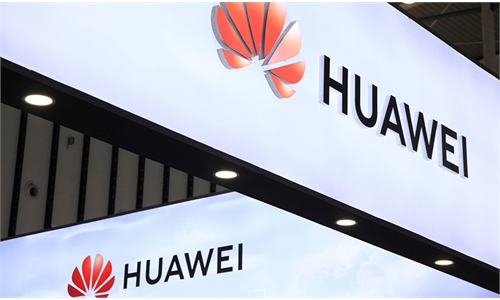SOURCE / INDUSTRIES
Telecom operators rush to promote 5G
Customers find inconvenience in staying with 4G network

People visit the 5G communication services exhibition area during the 2020 China International Fair for Trade in Services (CIFTIS) in Beijing, capital of China, Sept. 7, 2020. (Xinhua/Lu Peng)
As China ramps up efforts to commercialize its 5G network, domestic carrier users now find it inconvenient to hang onto the "old-fashioned" 4G network, with analysts saying the situation reflects discrepancies between 5G's commercial promotion and users' current needs.
All of China's three state telecom operators - China Mobile, China Unicom and China Telecom - have put 5G in the spotlight on their apps. "No need to change your SIM card; no need to change your phone number. As long as you use a 5G smartphone, you could enjoy the 5G network," read a note on China Mobile's app.
However, this push has resulted in difficulties for some users to consult or change their 4G-related services.
Some carriers have even removed 4G mobile packages from their apps, leaving users to visit physical service sites or call customer service to solve their problems, according to media reports.
The topic "being forced to use 5G" was hotly debated on China's Twitter-like Weibo. An online survey launched on Monday by Sina, which operates Weibo, found that 79.42 percent of the surveyed netizens said the 5G mobile package is useless and they are still using 4G..
"I feel the 4G mobile package is expensive enough. Let alone 5G," a Weibo user commented under the survey.
The price of a monthly 5G network package varies from a low of 128 yuan ($19.16) to a maximum of 598 yuan, as seen by a Global Times reporter on China Mobile's app.
According to a customer service staffer at the Beijing branch of China Mobile, more than half of users here have upgraded to 5G mobile packages.
However, a Beijing-based 5G network user surnamed Shi told the Global Times that there are many "tricks" when it comes to 5G mobile packages.
"In addition to the package tricks of carriers, frequent lost connections and high power consumption of smartphones are other disadvantages of using the 5G network," Shi told the Global Times on Tuesday.
Telecom industry analysts said that "being forced to use 5G" was a result of the anxious promotion by Chinese telecom operators.
"Carriers included some fresh applications in their 5G mobile packages so that some can be tested for further improvements. They are guiding users into the 5G era and pushing them to change their handsets to 5G as soon as possible," Ma Jihua, a veteran industry analyst, told the Global Times.
"But they are being too hasty, as they all want to grab a bigger piece of the pie in the 5G market," Ma noted, adding that their pressure to build 5G base stations remains huge this year.
Xiang Ligang, director-general of the Beijing-based Information Consumption Alliance, said China's 5G industry requires a similar 5G user scale to catch up.
"It will be meaningless if China builds a great number of 5G base stations with few users," Xiang told the Global Times.
The transmission capacity of one 5G base station is 20 times more than a 4G base station, he noted, and encouraged users to embrace 5G.
More than 690,000 5G base stations have been rolled out in China, with 160 million 5G subscribers, the most in the world, an official with the Ministry of Industry and Information Technology said on October 26.
During the past year, China has become the world's No.1 in 5G gear rollout, and some top-tier cities including Shenzhen and Beijing have achieved full 5G coverage.
But carriers, the industry chain and users are facing the problems of huge investment, high operating expenses, less developed core applications and difficulty in recouping their costs, the Xinhua News Agency said.
"China is now moving into a 'no man's land' in terms of 5G development so it cannot draw lessons from experience from any other countries," Ma noted, adding the country refuses to follow others so it must develop cutting-edge technologies.



